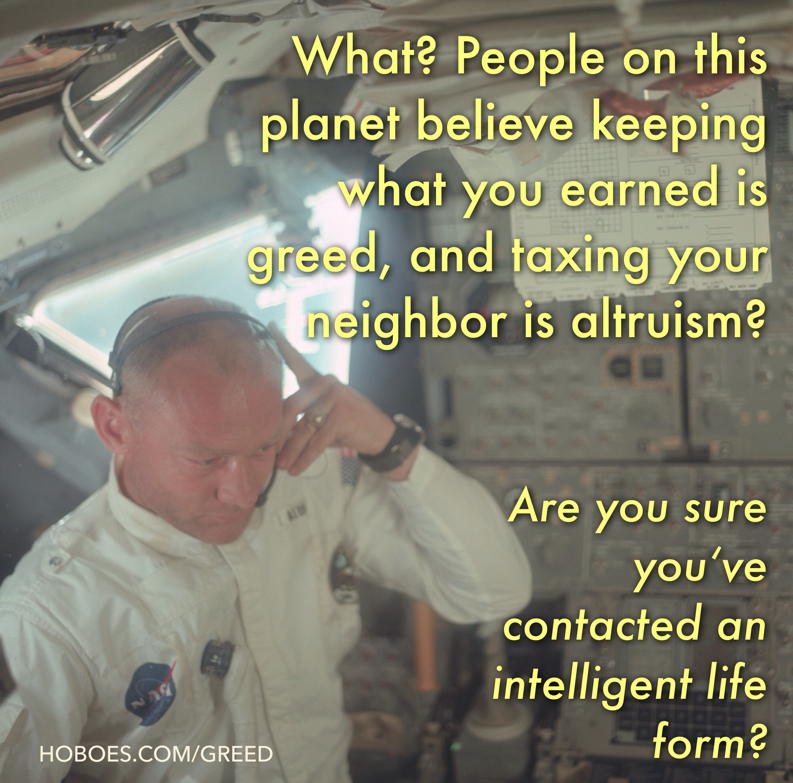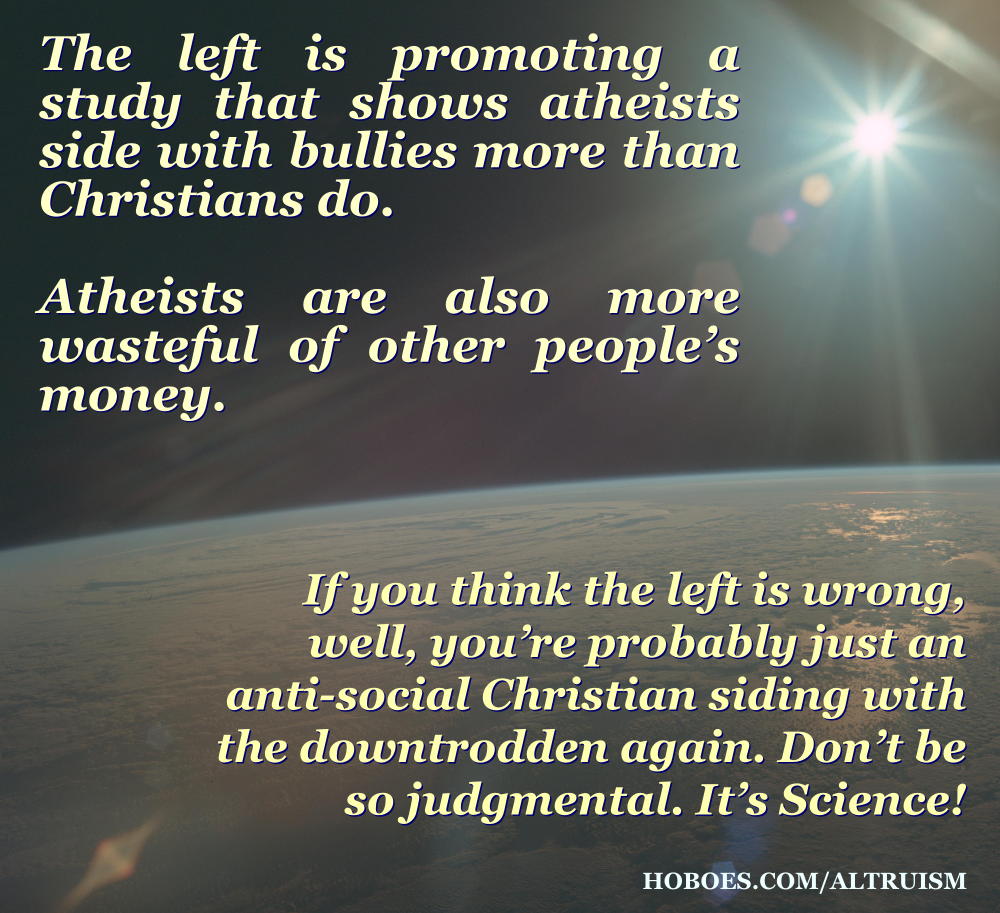Left believes atheists are wasteful bullies?
The left has recently been liking, sharing, and posting about a study from Current Biology that purports to show a negative association between religiousness and children’s altruism.
The conclusion that the researchers come to is pretty heavy:
Overall, our findings cast light on the cultural input of religion on prosocial behavior and contradict the common-sense and popular assumption that children from religious households are more altruistic and kind toward others. More generally, they call into question whether religion is vital for moral development, supporting the idea that the secularization of moral discourse will not reduce human kindness—in fact, it will do just the opposite.
The problem with the left using this study to say the world would be better off without religion is that it also shows a clear tendency of those without a religious upbringing to side with victimizers over victims. The researchers word the results as that “children who are raised in religious households frequently appear to be more judgmental of others’ actions”, but the actions were ones that caused “interpersonal harm”. From the description, the actions were the actions of bullies. It would be just as easy, if not easier, to claim that the study showed children from non-religious households side with bullies more often than children from religious households.
That, however, is not an interpretation that supports “secularization of moral discourse.”
Further, if you look at the graph the data indicates that Islam is worse than Christianity when it comes to altruism. The graph labels that difference as “ns.” for “not significant”, but it doesn’t tell us what the significance level is. But regardless of that, the graph doesn’t fit well with the comments that the left is leaving on the study, such as “I have seen stats that over 40% of Americans are evangelical Christians. I suspect they are the worst”.
Folks, you can’t pick and choose your study results. If you want to believe this study when it says Christians are less altruistic, you’re also going to have to believe that the non-religious are more likely to side with bullies—and possibly, that Islam is worse than Christianity when it comes to altruism. Certainly not the other way around.
Personally, I think that the study is a load of crap. If you read the way it was performed, there is no way you can go from the results to the conclusion I quoted above. The altruism portion of the study goes out of its way to take all information away from the participants about who they are giving someone else’s resources to. It isn’t necessarily altruistic to give resources to unknown recipients, nor does it make one lacking in altruism to avoid giving resources away willy-nilly—especially when, as in this case, the participants were giving away other people’s resources. You might as well say that it’s just as altruistic to give grant funds to Donald Trump as it is to give grant funds to the Sisters of the Poor.
Really, re-reading how they performed the study, you could just as well interpret it as showing that children with a non-religious upbringing are more wasteful of other people’s resources than are children with a religious upbringing in addition to that children with a non-religious upbringing identify more with bullies than religious children do. This appears to be yet another study where the interpretation far outstrips the data, where the conclusions tell us more about the researchers than they do about the study itself.
In response to 2015 in photos: For photos and perhaps other quick notes sent from my mobile device or written on the fly during 2015.
- November 11, 2015: Religious upbringing study uses odd definition of altruism
-

The more I have time to reflect on the University of Chicago’s religious upbringing altruism study, the more I think this study epitomizes the poor state of social science research today. When I majored in Psychology at Cornell thirty years ago, there was a fight in progress between people who wanted to find a way to turn psychology and sociology into hard sciences, using the scientific method, and those who wanted to keep it soft, barely even defining their terms let alone treating it as a real science.
From most of what I’ve been reading over the last year, it looks like the hard science faction lost, and badly. It’s not just that science reporting has gotten worse or even that the studies themselves are often impossible to replicate. It’s that the researchers don’t even understand what they are looking for, so that even if the study can be replicated, it still has no meaning.
That’s the religious upbringing study’s biggest problem. It doesn’t define what it’s studying. It purports to study altruism and judgmentalism, but it never describes what it means by those terms. These researchers seem to have wanted to study morality without caring what morality means. The result is that they don’t understand what they’re studying enough to make judgments on it, certainly not the sweeping judgment that religion is bad for the world.
In order to understand how they think of altruism and judgmentalism, we’re forced to backport a definition from their conclusions and from how they designed the study. Reading the study, it appears that what they mean by altruism is a willingness to be free with other people’s resources, a willingness to give to anonymous others without ever finding out who those others are or what they really need.
In other words, their definition of altruism sounds a lot like paying taxes and being a government bureaucrat. Altruism, according to the way they performed the study, means government bureaucrats giving taxes to the University of Chicago to perform social science research into the immorality of religion.
It calls to mind Thomas Sowell’s observation that it is always greed to choose where your money goes, but never greed to take other people’s money to hand out.
- The Negative Association between Religiousness and Children’s Altruism across the World: Jean Decety, Jason M. Cowell, Kang Lee, Randa Mahasneh, Susan Malcolm-Smith, Bilge Selcuk, and Xinyue Zhou
- “…religiousness was inversely predictive of children’s altruism and positively correlated with their punitive tendencies. Together these results reveal the similarity across countries in how religion negatively influences children’s altruism, challenging the view that religiosity facilitates prosocial behavior.”
More government funding capture
- Gain-of-bureaucracy disease
- Bureaucracies do not admit they’re wrong; scientists are always trying to prove they’re wrong. Government funding is diametrically opposed to the advancement of science.
- Of (Laboratory) Mice and Men
- If funding is your customer, the incentives are very different than if patients are your customer. Competition to meet bureaucratic definitions is inferior to competition to meet real human choices.
- Prescriptive vs. performance mandates
- Do performance mandates matter? They’re arguably better than prescriptive mandates, but they still divert progress away from real progress and toward bureaucratic definitions.
- CDC warns gun owners to beware of the leopard
- More evidence that the CDC cannot be trusted doing research on firearms ownership.
- Government Funding Disorder
- Why would “internet gaming disorder” receive four times the research of postpartum depression? Because one promises to increase the power of government, and one just helps women.
- Six more pages with the topic government funding capture, and other related pages
More memes
- The Jurassic Park shutdown
- You know what else was opened before it was ready?
- Reagan’s Lincolnian Revolution
- Reagan provided an alternative to the assumption held by both parties that bureaucracy was superior to individual freedom.
- The eye of the insulter
- The left has become so unhinged that they’re sending out promo photos for President Trump, thinking they’re insulting him. They seem to have a pathological inability to appreciate working, and don’t recognize a serious working photo when they see one.
- Slavery does not create wealth
- Frederick Douglass was born in slavery and escaped it. He tells us that slavery by its very nature destroys rather than creates wealth. That it creates a poverty not just of mind and spirit, but of the pocketbook as well.
- Red Light Cameras and rock-throwing children
- When the left sees a kid throwing a rock at other kids, they see an opportunity: to stop budding geologists from collecting rocks.
- Nine more pages with the topic memes, and other related pages

